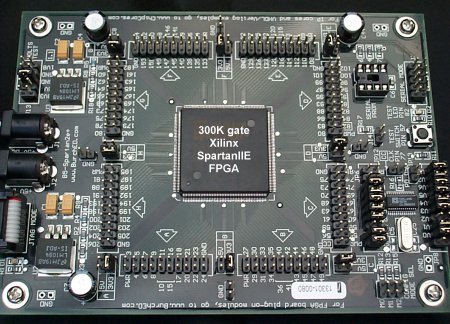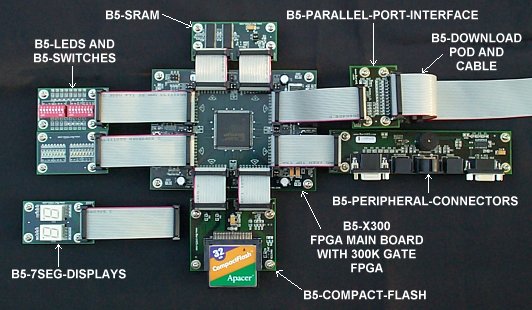BurchEd B3 and B5 FPGA boards; reminisces and documentation
Monday, 15 April 2013
The first FPGA board that I ever used was a BurchEd B5. I used it to build a CPU. Not a very good one, but my first, and it worked. This was during 2002-2003; it was my third-year undergraduate project.

The board features a Spartan-IIE FPGA, said to implement the equivalent of 300,000 logic gates. It is very small and slow by modern standards, and in fact no longer supported by recent versions of the Xilinx FPGA tools. (At the University of York, we keep old versions of ISE specifically in order to use these legacy devices if necessary, though the need rarely arises.)
I was reminded of the B5 while using one component from the B5 kit: an I/O interface board featuring a MAX3232 serial port line-level converter which converts the high voltages of RS232 to the level used by the B5 (3.3V, I think). This is a useful piece of kit in its own right, very handy for connecting a PC to any FPGA or microcontroller, not just the B5.
I set out to find the documentation for this board, and discovered that it is no longer on the web. BurchEd is no longer in business, and the documentation is gone, having disappeared with BurchEd's website. Until now, for I found the files on my hard disk, and have made them available again here:
- http://www.jwhitham.org/c/BurchEd/b5/ (B5 files)
- http://www.jwhitham.org/c/BurchEd/b3/ (B3 files; older generation device)
As to what happened to BurchEd, I do not know. The company did something that is still innovative - namely, making low-cost bare-bones FPGA boards which were affordable by universities. And they did it before anyone else. And their boards are easier to interface to breadboards and TTL than any other FPGA board that I have seen since. The sheer number of pins exposed for user connections is seriously impressive. There were plug-in add-on modules, much like Arduino shields, including the I/O interface board I mentioned earlier. Here are some of them:

Even today, the idea of making a low-cost FPGA board for hobbyists is rare and special enough to merit a Kickstarter project like this one. (I'm still toying with the idea of ordering one; it's much cheaper than an Atlys board, but then, no RAM...)